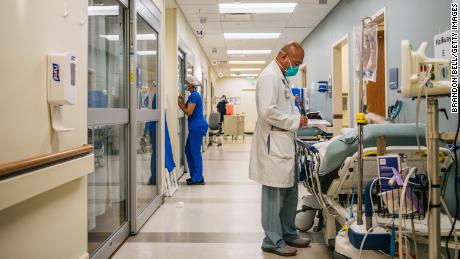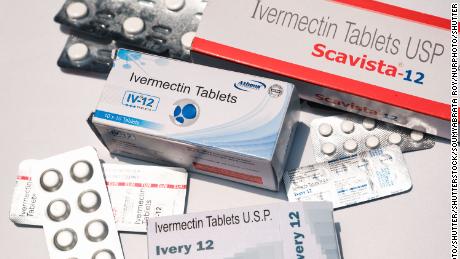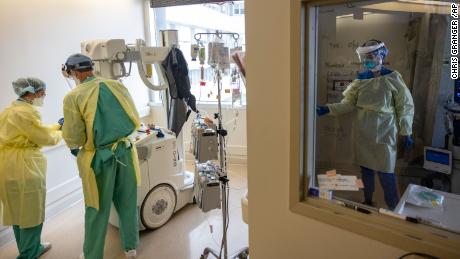(CNN)With the "imminent" full approval of the Pfizer/BioNTech vaccine expected, more businesses will likely issue vaccine mandates to help prevent the Delta variant from sending the country further backward in this pandemic, doctors say.
"For businesses and universities that have been thinking about putting vaccine requirements in place in order to create safer spaces for people to work and learn, I think that this move from the FDA ... will actually help them to move forward with those kinds of plans," US Surgeon General Dr. Vivek Murthy told CNN on Sunday.
All three Covid-19 vaccines used in the United States have been vetted and granted emergency use authorization by the US Food and Drug Administration.
The Pfizer/BioNTech vaccine may become the first to be granted full FDA approval following the review of months of additional safety and efficacy data.
That approval is "imminent," but no date has been mentioned, a senior federal official told CNN on Friday.
Businesses don't need full FDA approval to mandate a Covid-19 vaccine -- they already have legal authority to do so, according to the US Equal Employment Opportunity Commission. But full approval could give any legal challenge less potency.
Full FDA approval would also give some skeptics of the Covid-19 vaccine more confidence in getting shots, according to research by the Kaiser Family Foundation.
"This FDA approval cannot come a moment too soon," said emergency physician Dr. Megan Ranney, associate dean at the School of Public Health at Brown University.
"With this full approval in hand, we're going to have a chance to message again about the safety and effectiveness of this vaccine. We can help to fill the airwaves and the newspapers and social media with messages about what a difference this vaccine makes in terms of preventing hospitalization and death, even in the face of the Delta variant," Ranney said.
New vaccinations increase, but with a caveat
With the Delta variant fueling more Covid-19 deaths and hospitalizations -- including among children -- the rates of new vaccinations have recently increased.
On Saturday, for the third consecutive day, more than 1 million doses were administered, according to data from the US Centers for Disease Control and Prevention. Such a feat had not occurred since the first week of July.
But it's important to remember the vaccines don't fully kick in until two weeks after the final dose. "Keep taking all precautions until you are fully vaccinated," the CDC says.
"So we're still looking a tough couple of months ahead," Ranney said.
About 51.3% of Americans have been fully vaccinated against Covid-19, according to CDC data.
Many Americans still need to get vaccinated to minimize the spread of the Delta variant and help keep children in classrooms, former CDC Director Dr. Tom Frieden said.
"We're encouraged by the increase in uptick of vaccines. But remember, you've got something like 90 million (eligible) people not vaccinated," Frieden said Saturday.
"So a million (vaccine doses) a day leaves you months and months of lots of people susceptible to severe illness or death."
'Seriously, y'all. Stop it,' FDA warns of horse drug
A myth that the drug ivermectin can somehow treat or prevent Covid-19 has resulted in people getting hospitalized "after self-medicating with ivermectin intended for horses," the FDA said.
The FDA tweeted a blunt warning for anyone trying to use ivermectin against Covid-19: "You are not a horse. You are not a cow. Seriously, y'all. Stop it."
Ivermectin is an anti-parasitic medication, not an anti-viral. While it can be prescribed for humans suffering from parasitic worms or head lice, it's often given to much larger animals -- at much greater concentrations.
"Such high doses can be highly toxic in humans," the FDA said.
Still, the Mississippi Poison Control Center has received an increasing number of calls from people who took ivermectin. At least 70% of such calls related to "ingestion of livestock or animal formulations of ivermectin purchased at livestock supply centers," the Mississippi State Department of Health said Friday.
"Some of the symptoms associated with ivermectin toxicity include rash, nausea, vomiting, abdominal pain, neurologic disorders, and potentially severe hepatitis requiring hospitalization," the health department said.
The US surgeon general said tech companies need to do more to stop the spread of misinformation.
"It's happening ... aided and abetted by social media platforms," Murthy said.
"These are things that companies can and must change. And I think they have a moral responsibility to do so, quickly and transparently."
He said the myth about ivermectin as a treatment for Covid-19 highlights "the profound cost of health misinformation."
"It is not a recommended drug to prevent Covid-19," the surgeon general said. "The best protection we have against Covid-19 is the vaccine."
Covid-19 hospitalizations reduce resources for others
The number of people hospitalized with Covid-19 jumped to 95,000 as of Saturday, according to data from the Department of Health and Human Services.
More than 23,000 of them were in ICU beds, reducing resources for others who need hospital care.
Several states, largely those with below-average vaccination rates, have reported hospitals reaching 100% capacity during this Delta variant surge.
In Mississippi, the number of Covid-19 patients requiring hospitalization or intensive care reached record highs last week, Gov. Tate Reeves said.
The major problem with resources is "not a lack of beds," Reeves said Thursday. "It is a lack of staff."
He encouraged Mississippians to get vaccinated.
In Florida, Orlando's mayor has asked residents to conserve water as liquid oxygen -- typically used to treat the local water supply -- was being diverted to hospitals locally and statewide to treat critically ill Covid-19 patients.
"This is another impact of the virus continuing to surge in our community," Mayor Buddy Dyer posted on Facebook.
"And it's another result of what happens when residents do not get the vaccine and become critically ill, needing medical support and treatment."
CDC: Those at high risk should avoid cruises for now
Unvaccinated people are strongly urged to avoid cruise travel, the CDC said.
And people at high-risk for severe Covid-19, even if they're vaccinated, are advised to stay off cruise ships, the CDC said in updated guidance Friday.
"If you are at increased risk for severe illness and considering cruise travel during the Covid-19 pandemic, discuss this type of travel with your healthcare professional," the CDC said.
"Older adults and people of any age with certain underlying medical conditions are more likely to get severely ill if they get Covid-19. People with weakened immune systems, including people who take medicines that suppress their immune systems, may not be protected even if fully vaccinated."
Anyone who has Covid-19 symptoms, was exposed within 14 days to someone with Covid-19, or is awaiting results of a Covid-19 viral test should not board cruise ships, the CDC said.
The cruise industry has been battered by the Covid-19 pandemic and has made strides to provide safe travel for passengers. But some infections have been reported.
The CDC has worked with cruise lines to authorize their operation and has a website with infections on individual ships.











